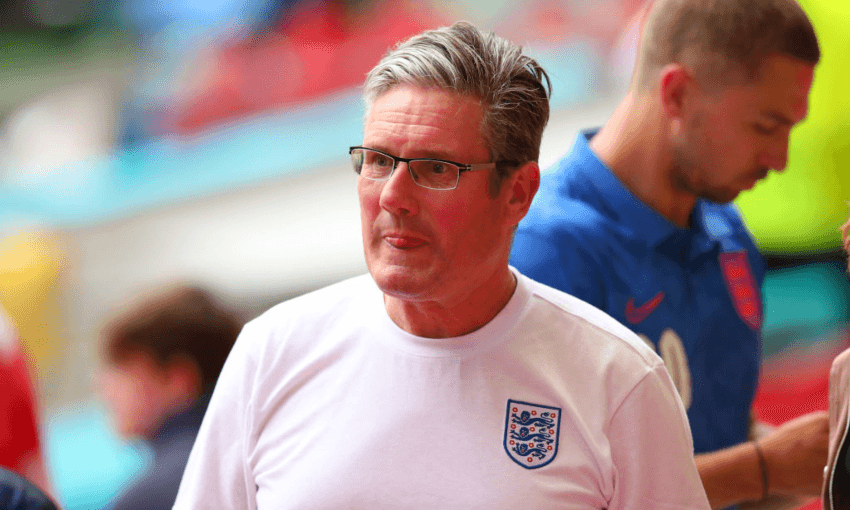A shallow landslide for Keir Starmer, and a boilover in France, where the left and centre rally against the far-right Rally. Toby Manhire calls Henry Cooke to find out what it all means.
In the final days before the UK election on Thursday, the Sun called for a change in government. No surprise there: the once-influential tabloid likes to back a winner, and Labour’s win was so nailed-on that foreign correspondent Lisette Reymer, in a bravura report for Friday’s final Newshub bulletin, was able to declare a landslide from the past. “Today’s result was so predictable I was able to confidentially film this weeks in advance before flying home to New Zealand,” she said from out front of No 10.
The Sun treatment, however – “Time for a new manager” – inadvertently hinted at a meaningful parallel in framing its semi-endorsement via international football. England has progressed to the semi-finals of the Euros by doing almost nothing, adopting a cautious, uninspiring, charisma-free strategy that sent millions to sleep, and achieving a historic result by doing what is required under a blunt scoring system.
And Labour under Keir Starmer has done just the same thing. Having opened up a lead of around 20 points following the departure of a disgraced Boris Johnson, Labour adopted what some called a “Ming vase strategy”, essentially doing as little as possible to shake a country from its determination that the Tories, after 14 years, must be cast out.
Was the result, then, which saw Labour take a massive 412 of 650 seats in the Commons, really a big victory for Labour, or just a repudiation of the incumbents?
“I think it’s both,” said Henry Cooke, a New Zealand political writer currently based in London. “It was a huge repudiation of the Tories. You can see that in the amount of strategic voting, the wins for the Lib Dems, the [support for the far-right] Reform. It’s one of their worst results ever, for a party that has existed longer than ‘New Zealand’ has as a country. That said, Labour in government have a huge amount of power for the next five years. They’ve taken that good situation and run with it very well.”
One of the most remarkable parts of the win was “how shallow the victory is, given how low the popular vote is for Labour”, said Cooke, speaking for a special edition of the Spinoff podcast Gone By Lunchtime. While winning a landslide 412 seats, or 63% of the Commons, Starmer’s party won just 33.8% of votes overall. At the other end of the spectrum, in more than one sense of the word, Nigel Farage’s Reform Party secured five seats, about three-quarters of one per cent of the house, despite winning 14.3% of the overall vote.
“While that’s a very genuine serious debate to have, it’s probably worth noting that they play to the electoral system they’re in,” Cooke cautioned. “You don’t play rugby union to rugby league rules because you prefer rugby league. While there was a low popular vote for them, they did have a particularly efficient, they call it, strategy, where they won a huge array of seats. While the big structural thing in the election was everyone wanting to get the Tories out, Labour have taken that hand of cards and played them perfectly.”
In France, meanwhile, another front page captures another mood. “It’s bonkers,” reels Monday morning’s Libération. Its summary: “The left has delivered a huge surprise by finishing first in the legislative election. The republican front was backed hugely, relegating the National Rally to third. Divided into three blocs, the new national assembly does not have an absolute majority.”
And bonkers it is. Polling had suggested the morning would bring victory for the far-right National Rally (formerly the National Front), with the only question being whether it could command a majority in the assembly. And yet, according to exit polls, at the onzième heure voters had decided in the second round to back the National Popular Front, a left and green grouping, and Emmanuel Macron’s centrists, bumping the National Rally to third. That appeared to be the result of a high turnout and, critically, the coordination on the left and centre, with candidates dropping out in more than 200 seats to avoid splitting the vote against the party of Marine Le Pen, said Cooke.
Could that then be seen as ultimately a vindication of President Macron, who took a big gamble after far-right success in European elections a month ago and sent the country to the polls? Not quite, said Cooke. “I think his strategy was not to let the leftwing parties become the largest group. His strategy was to have a new republican front election where, much like in the presidential elections, the left end up grumbling along after the centrist parties … The new prime minister will [probably] be from a party that is not at all aligned with him. They’ll have to work out some kind of coalition, but it will not be a government as Macron would like it.”
One of Macron’s biggest battles over recent years had been to rise the pension age. “And both the left and the right are opposed to that. So you can see potentially some kind of backtracking on that as the cost of power.”
Follow Gone By Lunchtime on Apple Podcasts, Spotify or wherever you listen to podcasts.

